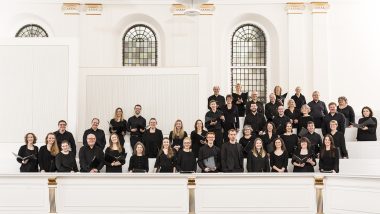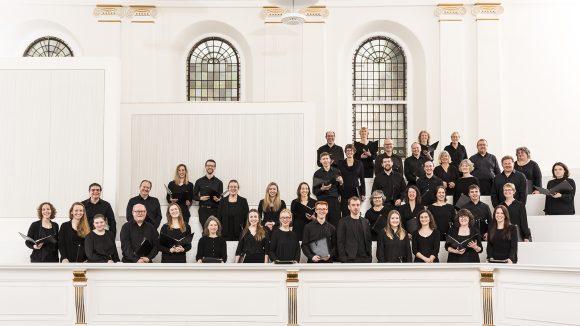 United Kingdom Mendelssohn, Bach, Schumann, Schubert: Ruby Hughes (soprano), Idunnu Münch (mezzo-soprano), Thomas Walker (tenor), Callum Thorpe (bass-baritone), Stephanie Gonley (director/violin), Marcus Barcham Stevens (violin), SCO Chorus, Scottish Chamber Orchestra / Gregory Batsleer (conductor). Queen’s Hall, Edinburgh, 30.11.2023. (SRT)
United Kingdom Mendelssohn, Bach, Schumann, Schubert: Ruby Hughes (soprano), Idunnu Münch (mezzo-soprano), Thomas Walker (tenor), Callum Thorpe (bass-baritone), Stephanie Gonley (director/violin), Marcus Barcham Stevens (violin), SCO Chorus, Scottish Chamber Orchestra / Gregory Batsleer (conductor). Queen’s Hall, Edinburgh, 30.11.2023. (SRT)

Mendelssohn – Verleih uns Frieden
J.S. Bach – Concerto in C minor for Two Violins, BWV 1060R
Robert Schumann – Nachtlied
Schubert – Mass in A-flat
Like the sun during a Scottish winter, the SCO Chorus doesn’t appear much, but it makes a big impact every time it does. Carrying on the imagery, this performance of Schubert’s Mass in A-flat was like a bright shaft of sunlight on a freezing winter’s night.
They are surely the finest choir of their size operating north of Hadrian’s Wall, renowned for their energy, their precision and sheer musical communicativeness. All that was there tonight, alongside a good dose of spiritual drama, too. They sang Schubert’s Kyrie with distinguishing blocks of sound, getting close to the organ-like textures that the composer was surely aiming for, and moved from this into the jubilant energy of the Gloria (overshot by one over-enthusiastic chorus member) with a sense of the text’s and the music’s leaping celebration. Their articulation at the opening of the Credo was quietly perfect, and the explosive joy of its Amen was terrific.
The excellence of their singing is, of course, partly down to their chorus master Gregory Batsleer, who here warranted cheers of his own by conducting the combined forces of the chorus and the Scottish Chamber Orchestra. He resisted all the temptations to give the limelight to the chorus, instead giving space for Schubert’s wonderfully strange orchestral textures, such as the wheezy natural brass in the early section of the Gloria, the mystical winds of Et incarnatus est and the strident strings of the Crucifixus. Indeed, the overall balance of the performance was a striking success, nowhere more so than in the great fugue that ends the Gloria, the highlight of the whole evening. Each choral line was cleanly elucidated and built together with architectural certainty, but the balance with the running violin lines of the orchestra was kept level, producing an exhilarating overall effect.
The quartet of soloists mostly blended well, though I didn’t enjoy the strident edge to the voice of soprano Ruby Hughes, nor some occasionally distracting, rather melodramatic, physical gestures. Idunnu Münch’s darkly lustrous mezzo-soprano and Thomas Walker’s bright tenor matched one another well, and Callum Thorpe’s bass-baritone was rich and authoritative. Overall, a great success.
I wish I could say the same for the first half. Maybe it was because I was in a part of the Queen’s Hall where I don’t usually sit – under the balcony, which I guess could make the sound a little boxy, but I can’t compare it for sure – but the chorus sounded tentative and uncertain in their singing of Mendelssohn’s Verleih uns Frieden, and nor did they balance effectively with the cello line of the opening, turning what should be a warm smoking jacket of sound into something uncomfortable and unbalanced. Maybe my ear had tuned into the unusual acoustic by the time they got to Robert Schumann’s Nachtlieid, because it sounded better alongside the brooding orchestral introduction. Schumann runs out of ideas about five minutes before this overlong piece’s conclusion, however, and spends the last chunk going round in circles as though too taken with his own inspiration.
And I will never know whether it was the balance, the acoustic or the performing version which bothered me in the performance of Bach’s Concerto for Two Violins. This is a reconstruction of what might have been the original version of his double harpsichord concerto BWV 1060, but the pair of violins struggled to make an impact against the rich bed of string sound that surrounded them. Stephanie Gonley and Marcus Barcham Stevens are both regular members of the SCO, so they should know well how to perform with members of their own team, but often I struggled to hear them, their instruments absorbed by the warm, full-bodied orchestral texture. Only in the slow movement, where the soloists had the feeling of a couple finishing one another’s sentences, did this become more winning, but overall, I ended up wondering whether it was really wise to reconstruct this concerto for this choice of instruments.
Maybe the Schubert was genuinely better, and maybe my ear had just tuned in more effectively by then. Either way, this was a concert of two halves, at least from where I was sitting.
Simon Thompson
